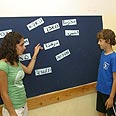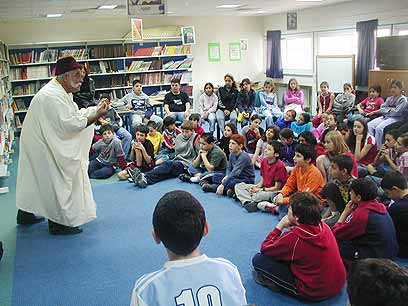
Language as a cultural bridge
The Abraham Fund, a coexistence NGO hopes to expand Arabic education in Israeli schools to 5th and 6th grade students. The program teaches young children Arab culture and language in an effort to tear down cultural walls
In 2004, the Abraham Fund created its first pilot program to promote coexistence among elementary school children by introducing Arabic into Israeli curriculum. The organization hopes to utilize language and cultural understanding as a means to improve Jewish-Arab relations.
Students learning spoken Arabic
Currently the Education Ministry requires compulsory Arabic classes for students in 7th, 8th and 9th grade. The Abraham Fund hopes to influence government policy to expand the program to 5th and 6th graders.

Educators teach about their culture (Photo courtesy if the Abraham Fund Initiatives )
One of the Abraham Fund's main concerns is that Israeli students are being taught classical Arabic and not spoken. If Israeli students begin studying Arabic at an early age they will be less likely to develop societal stereotypes. By starting Arabic language education at an earlier age, the Education Ministry will have to re-evaluate how to train teachers working with 7th, 8th, and 9th grade classes, who will have a higher proficiency of Arabic than ever before.
Currently The Abraham Fund is offering free skype counselling for teachers who want to brush up on their Arabic or access new educational resources.
Program hopes to expand
The program has been implemented in over 100 schools throughout Haifa, Jerusalem, and the north of Israel. Initially the program found that Jewish students were not interested in learning Arabic. For many kids, Arabic was seen as the language of the enemy and not rather than a necessary tool in today's Israel. But this is gradually changing.
The program has designed a curriculum with an emphasis on speaking, and finding mutual cultural symbols that relate to all religious groups in Israel. Some 85% of all teachers in the program are Arab. Many Jewish students have not been exposed to Arab community leaders in such a close environment and the interaction with their teachers enables them to do so. Instead of reading about Muslim holidays and customs in text books, children get to relate to educators that can present a more accurate representation of their culture firsthand.
In the past many kids reported feeling scared every time they heard Arabic being spoken on the street or on a bus. But once they are able to recognize a few words, the language becomes less threatening and more accessible.
A 5th grade student from Jerusalem said, “It's fun and very interesting to learn a new language. The songs and games are fun. Saidah is a great teacher. She lets us play games in Arabic and we learn a lot”. The children no longer feel threatened when they see a woman wearing a burka because they have formed a bond with their teacher.
Assistant executive director Josh Simon told Ynet, “The project was made possible by a generous grant from the Jewish Agency, and we hope they continue their support so we can expand the program in the upcoming school year.”










